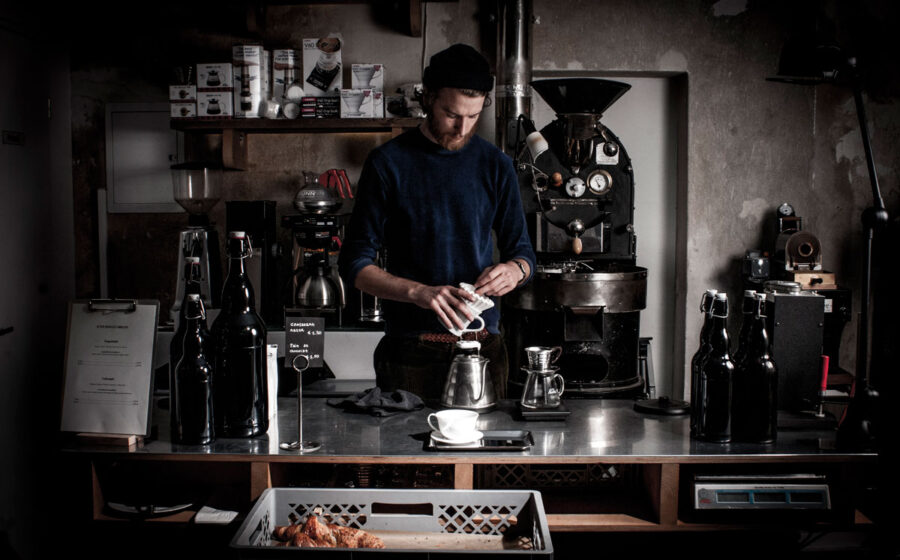[F]rom its non-descript gray brick exterior, passersby could easily mistake Bonanza Coffee Roasters for any number of hip boutiques and cafés on one of Prenzlauer Berg’s most gentrified streets in former East Berlin, just blocks from where the Berlin Wall once stood. Even its slight neon sign, a scroll of cursive letters that reads, Bonanza Coffee Heroes, is hard to decipher. But no matter; Bonanza has made a name for itself (despite appearances) as Berlin’s original roastery, which has been setting standards in the capital for almost a decade.
Launched by Berliner Yumi Choi and her business partner Kiduk Reus back in 2006, Bonanza Coffee Roasters (formerly Heroes) was the first of its kind—a boutique roastery that brought quality coffee to the lips of the deprived. Even after the Wall came down, choices in Berlin were sparse. Before the mid-2000s, you’d be hard pressed to find a good cup.
“I loved coffee. I was one of the people who hung out in coffee shops,” says Yumi. “But I must confess I drank really bad coffee. I was feeling existential and sipping on really disgusting latte macchiatos,” she laughs. Yumi thanks Berlin’s ex-pat scene for bringing food and beverage culture to her city. And taking a cross-section of Berlin in 2014, culinary choices are exceedingly diverse, compared to even five years ago when a taco was like an alien artifact.
It all started with a visit to Monmouth Coffee Company in London. As one of the first well-received specialty coffee shops in the UK, Monmouth is known for roasting coffee from single farms, estates, and cooperatives. When Yumi tried it for the first time, it was as if her taste buds got struck by lightning—something clicked. “You cannot drink other coffee. After that you can never go back again,” she says. “It was a journey of awareness of the different aspects of this everyday product.”

Around this time, Yumi was working as an artist in Berlin, and Kiduk convinced her to take the plunge. What followed was an exploration into the coffee scene, while they researched a business model that would suit them best, eventually shying away from fair-trade for pricier, higher-quality beans. “I think for some people it works,” says Yumi of fair-trade sourcing, “But we’d rather focus on quality and pay for that, than for realizing a political idea.”
Bonanza buys boutique coffee beans from Ethiopia, Guatemala, El Salvador, Kenya, Indonesia, and Colombia and pays a significantly higher premium than fair-trade prices. Yumi regularly visits cafes and roasters across Europe to bring back sample beans, which they also sell in the shop. “That’s what we’re here for, to showcase how coffee can taste, but also to share what’s going on internationally in the coffee world,” she says.

“Because we don’t have a lot of space, we really had to focus,” says Yumi. “We have the luxury to just do coffee. I think a lot of cafe owners don’t have this luxury—they need to offer food and the whole package. But we always had the intention to open a roaster and focus more on what happens behind the scenes.”
Bonanza roasts for and supplies a number of Berlin cafés, but consultation is their key to spreading success. Other companies look to Bonanza for advice on setting up their own cafés, and of course how to incorporate the newest developments in coffee.
“When we opened we made all the mistakes you could make. We can speak from experience,” laughs Yumi.

Bonanza customers tend to be a mix of German- and English-speakers from across globe. It pulls an attractive, cosmopolitan crowd that knows taste. Today, Berlin’s roasters and coffee connoisseurs have formed a network called the Berlin Coffee Society. And though Bonanza may have been the first on the block, their clientele now has choices in one of Europe’s most vibrant capitals.
“There’s a healthy competition, and I think in the last year it really popped up. But it’s really good for the people of Berlin because they get such good coffee to choose from,” Yumi says with a grin. “So they’re kind of spoiled for a good price.”
—Melanie Sevcenko is an Irish-Canadian journalist working in both radio and print.
—Photos by Rodolfo Ruffatti Batlle.









